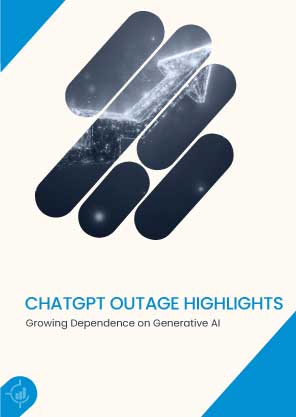or call: +1 (845) 347-8894

or call: +1 (845) 347-8894

What do you mean ChatGPT is down? On June 10, 2025, at approximately 2:45 PM IST, a global outage struck ChatGPT, spreading through APIs, web, desktop, mobile, and even OpenAI’s video system, Sora. Millions of professionals, students, and entire teams came face to face with a harsh reality: without a backup plan, daily workflows grind to a halt. Error messages and frustrating delays became reminders that we’ve entrusted generative AI tools to perform essential, non-replaceable roles.
The shutdown was a wake-up call to the world’s tech community. What most wrote off as a temporary glitch exposed a deeper, structural realignment: generative AI is not optional. It’s an indispensable pillar of our knowledge economy, woven into everything from composing emails to navigating codebases and scripting client replies. The reliance isn’t incremental; it’s exponential. And without strong protections in place, the effects of a single system’s loss resonate around the world.
This wasn’t just a five-minute hiccup. According to DownDetector, reports surged from ~25 to over 1,250 within minutes, a 4,900% rise. One analyst described it as “the longest and most far-reaching service interruption yet—over 10 hours of downtime.”
Here’s what we know:
This wasn’t a glitch but a global business disruption. Entire businesses went idle; students couldn’t complete assignments; journalists lost deadlines. Posts like “Am I supposed to use my brain now?” quickly trended.
The ChatGPT outage didn’t just interrupt workflows—it exposed just how much we rely on generative AI across industries, roles, and geographies.
We’ve reached a point where generative AI is not a tool but an extension of professional thought. It’s being used for writing, analysis, design, client communication, and decision-making. The outage served as proof: our productivity systems now lean heavily on AI with few manual alternatives.
Relying too heavily on generative AI systems like ChatGPT creates blind spots. Unlike traditional software, AI tools are dynamic, opaque, and constantly evolving. That brings several risks:
Generative AI is shifting the way we interact with knowledge, but overdependence without control invites system-level risks.
The outage revealed that many enterprises treat ChatGPT as a foundational layer rather than an optional assistant.
This makes outages not just disruptions, but exposures of a brittle foundation built without foresight.
The ChatGPT outage acts as a case study in how technological convenience can become operational vulnerability. Here are some pressing lessons:
Dependency is not just a productivity issue; it’s a governance challenge.
Balanced AI use should include ethical review boards, compliance frameworks, and sustainable computing practices.
This isn’t about scaling back AI, it’s about scaling responsibly. To thrive in an AI-reliant world, leaders must:
The ChatGPT meltdown was a strong reminder that AI is not only an upcoming technology anymore; it’s an infrastructure. And just like all infrastructure, it needs to be strengthened, made use of, and regulated. In expanding our capabilities, we’ve also expanded our risk management. It’s time to mature our AI plans, not only for innovation but for resilience. And if we do that, AI will remain a partner for progress, not a weakness in disguise.
The June 10 outage impacted APIs, web, mobile, and Sora globally, impacting users worldwide. It was more than an annoyance; it locked up workflows globally, highlighting the extent to which generative AI such as ChatGPT is now part of productivity.
Reports surged from ~25 to more than 1,200 in minutes, a ~4,900% increase. Regions impacted were the U.S., Europe, India, and others. API-based apps, students, writers, and developers were all disrupted.
OpenAI alone has 400 million weekly visitors. A worldwide survey indicates 58% of workers utilize AI on the job, with 70% using public tools. ChatGPT is a first choice for writing, research, coding, and emotional support for many
Overreliance creates sole points of failure. Users experienced panic, loss of faith, and stalled productivity. Mental atrophy becomes tangible where critical thinking and intellectual dexterity are offloaded to AI.
Consider generative AI as essential infrastructure, and as such, implement governance principles, diversify your vendors, keep human oversight, and have backup mechanisms. These days, having server backup power is just as important as AI resiliency.
To participate in our interviews, please write to our IntentTech Media Room at sudipto@intentamplify.com




